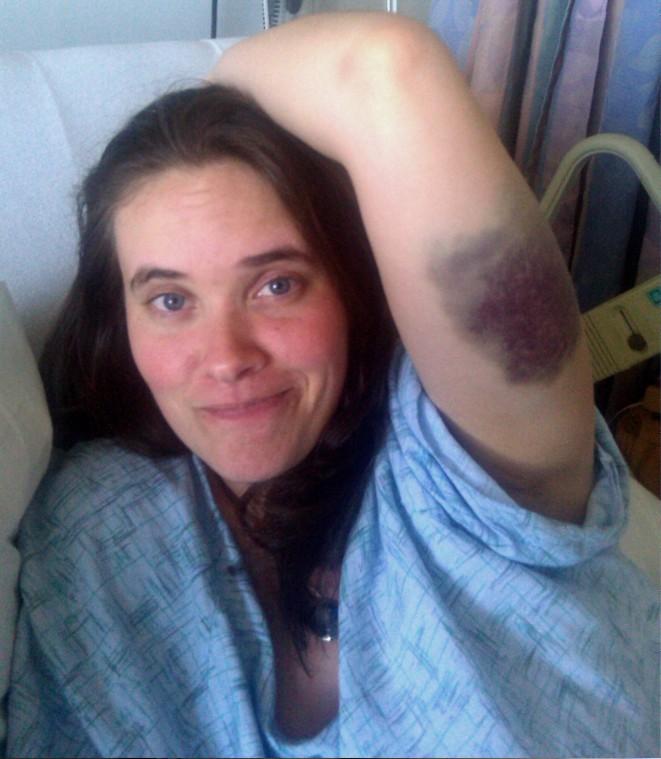Student refuses to let rare illness slow her down
bruise1:Senior jazz studies major Kate Janzen shows her bruise while at the hospital, being treated for idiopathic thrombocytopenic purpura.:Courtesy Photo
October 6, 2010
Kate Janzen often forgets she has a potentially life-threatening disease.
Janzen, senior jazz studies and classical theory and composition major, has idiopathic thrombocytopenic purpura, or ITP. The rare disease that causes blood platelet counts to plummet and dark purple bruises to form.
When her grandmother had a heart attack last year, Janzen went to the student clinic on campus “for the fun of it” because she was “curious about her inner workings,” and she discovered something was amiss.
“Everything was squeaky clean,” Janzen said, “except my platelet count.”
Her platelet count, measured in thousands, was in the 60s. Normal platelet counts are between 130 and 400.
“It was low, but not critical,” Janzen said. “It was the edge of critical. The doctor didn’t think anything of it.”
Janzen went about her life, practicing for her jazz recital. When she encountered dizzy spells, she visited the on-campus clinic again.
Her count was still in the 60s, but with no health insurance, she was reluctant to go to a hematologist.
When school started up for the spring semester, her stress level rose with her senior classical recital.
This past February, she made another startling discovery.
“I had a huge bruise on my arm the size of a silver dollar,” Janzen said. “It was totally random. I did not get hit.”
Bruises began appearing randomly.
“It looked like I was getting beaten on a daily basis, they were really dark purple,” she said.
In March, while she was sailing with friends, she bumped her arm.
“The bruise covered my entire forearm, and was dark, dark purple,” Janzen said.
She returned to the clinic, with dire results. Her platelet count was now 14, putting her at risk for cranial hemorrhaging – bleeding in the brain.
She waited an agonizing 12 hours in a hospital ER before being admitted.
“It was like the entire world had exploded and went to the UC Davis Medical Center, just at that moment,” she said.
She was performing piano for a play at the next day, and was eager to leave.
After seeing a hematologist, she decided to check herself out of the hospital, armed with a bottle of Prednisone, an anti-inflammatory drug that is part of chemotherapy.
Doctors hoped the drug would “reboot” Janzen’s immune system. While her platelet count was rising, the side effects were severe.
“Puberty-like, explosive acne, bipolar mood changes,” Janzen said. “That was really hard on the family. I also had the munchies like crazy, “moon face,’ where your cheeks look like a chipmunk, my vision blurred.”
Janzen lives with her family, who could tell that the side effects, such as the constant mood swings, were worse than what the drug was trying to cure.
“What really brought her down last semester wasn’t the ITP, per se, but the meds she went on to counter the ITP,” said her father Bill Janzen. “The cure was definitely worse than the cold.”
Kate Janzen was also unable to focus on work, and her hands became jittery, making it hard to play the piano.
“After six weeks, I weaned myself off the Prednisone,” she said. “The school doctor was worried. My platelet count plummeted from 90. I crashed and burned. But I told them, “It’s my choice, I’m doing it.'”
She finally went to see a hematologist, who wanted her back on Prednisone, with a dosage of 10 mg, one sixth of her original dose. She countered that the drug was destroying her career as a pianist and composer. The doctor accepted her argument, and she was off the drug within a week.
She put aside her studies as a music major and focused on learning all she could about the disease, in order to make an informed decision about a treatment that would let her continue to play music. She ordered books from Amazon, read articles and case studies, all in an attempt to be as informed as she could about blood, the immune system and ITP.
“I was very scared for Kate at first,” said her mother Jan Janzen, “but as we began to read about the disease and learn of others’ experiences, we felt more confident for her to get off of the medication and to go for a more natural approach.”
Kate Janzen’s interaction with her hematologist was out of the ordinary.
“It was an interesting dynamic with my doctor,” she said. “I was not an unknowledgeable patient. There was no hand-holding. It was not a typical scenario. I made the best-informed decision.”
She decided on a controversial method to raise her count &- water fasting. She spent July at True North Health Center in Santa Rosa, where for the first two weeks she only had water.
Here, she met people who were on other controversial treatments. People with diseases such as lupus and Type-2 diabetes and a woman who had had a constant headache for 16 years were all willing to share stories, including eventual relief of their maladies.
“It was the coolest experience in my life,” Janzen said. “It was life-changing, all positive.”
The center featured apartment-like rooms, two doctors on-call 24/7, and two lectures each day.
She came to the center with the lowest platelet count they had seen, at 12. She was told it would take three months to see any changes.
Janzen was at the clinic for nearly a month, with the doctors optimistic. Within the three months given, her count rose from 12 to 28. Her stay at the clinic had been a success, but not without a drastic change in lifestyle.
“Kate went through several changes since she was diagnosed,” said Sarah Lister, one of Janzen’s friends. “Her diet has changed so drastically that she needs to bring her own food where ever she goes. She seems to have more energy, a more positive outlook on life, and a better self-image.”
Janzen now limits herself to fruits, vegetables, grains, beans and nuts.
“It ruined eating out. Fast food tastes disgusting,” she said.
She also gets plenty of sleep and exercises daily, all of which keeps her platelet count hovering around 29, healthy enough to ride a bicycle and go sailing, even if the doctors tell her it is better if she stays home.
“She’s lost a lot of weight since going to a water-fast clinic in Santa Rosa,” Bill Janzen said, “and she feels great and is in high spirits.”
Kate Janzen’s mother echoed the sentiment.
“She is pretty much her old self,” Jan Janzen said, “except for her very healthy eating.”
Kate Janzen is once again working on her recital, having put it off for a semester.
“She is working very hard on her final recital to graduate, and I foresee a brilliant career in music for her,” said Kate
Janzen’s personal instructor Leo Eylar. “I consider her one of my top students in the last 22 years.”
Kate Janzen has an autoimmune disease, but the only way she reminds herself is the purple “Got Platelets?” bracelet she wears, the dangling medical information charm jingling as she walks.
Cole Mayer can be reached at [email protected]























































































































